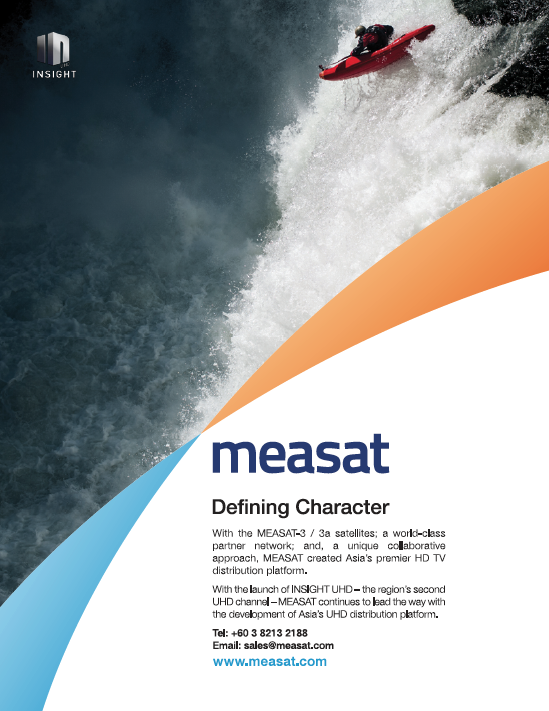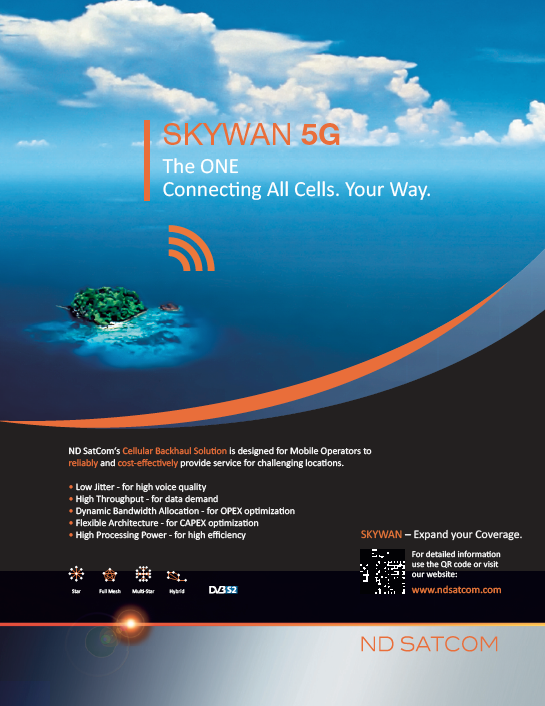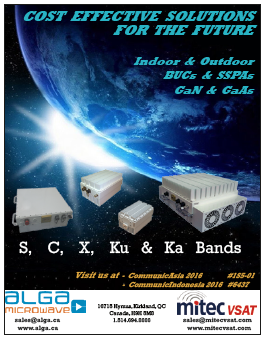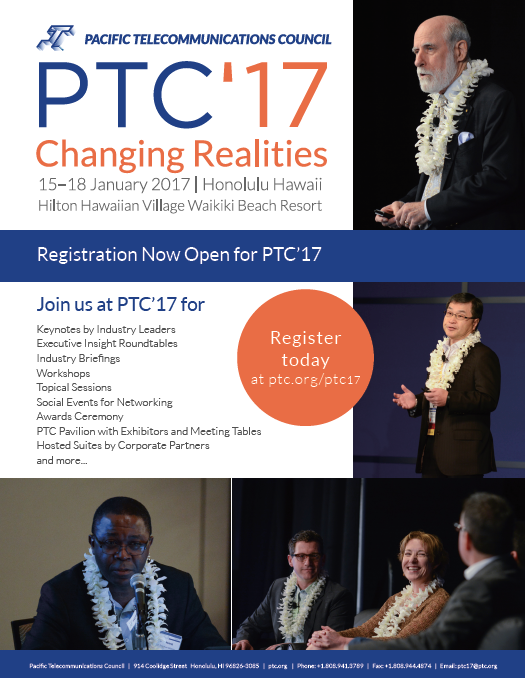Pierre-Jean Beylier (“PJ”) joined SpeedCast in 2000 as the Head of Sales and Marketing. He was appointed the Chief Executive Officer of the company in 2004.

PJ has been instrumental to the success of SpeedCast and managed the transition to the company’s current technology platform as well as guided the development of SpeedCast's strategic focus. He has more than 20 years of experience in international sales and marketing, including Black and Decker in France and at Rhodia, a French manufacturer of specialized industrial chemicals, where he operated in a number of roles that included export sales manager for one of the divisions, responsibilities for Southern and Eastern Europe, Middle East and Africa, and then managed key e-business projects in the Group. PJ graduated from Lyon School of Management and received a MBA from the University of Southern California.
SatMagazine (SM): During the last 12 months, SpeedCast has focused on becoming a truly global player by extending to every niche market for satellite services, becoming a major market consolidator. Can you please share your reasons behind these developments?
PJ Beylier
All the acquisitions we’ve made have been driven by one major objective—to ensure SpeedCast can sustain long term organic growth. These acquired companies come and fill a gap in our capabilities which allows us to have access to previously unavailable business opportunities. It is really the idea that together with these companies we can achieve much more.
One important aspect of the market we are seeing is that it is becoming a more global world. Customers want to buy globally and are expecting to have a partner who can serve them on a global basis, no matter where they are located. This is a key reason that SpeedCast strives toward becoming a truly global firm.
SM: SpeedCast has grown from 200 to more than 350 employees, and through its acquisitions, the company has retained 99 percent retention of the staff. It could be said that part of the reason behind SpeedCast’s sustainable position as a satellite and teleport services provider is due to its own strong community of engineers, accountants and senior managers as well as the CAST initiative. Can you share the core SpeedCast values behind CAST?
PJ Beylier
This is a project that is close to my heart. We have defined four core values at SpeedCast—the CAST values. The acronym translates to Customer-Focused, Agile and Responsive, Success through people and safety and Team spirit.
We launched a company-wide project last year where, in each quarter, the company would focus on one CAST value. Each quarter in every office of the group across the world, two hour workshops were held, facilitated by the head of the office and, when possible, a member of the management team who was traveling through the country at that time.
These interactive workshops were for people to express why that particular CAST value is important to them and how they think they can embody that value. We want the workshops to really emphasize how each of these values are important and how each one of us can try to better lead with these values on a daily basis in our jobs. We also created a corporate video around these four CAST values and this will show in each workshop.
We also have a coaching program for the members of the management team. Each of us have been evaluated by our direct reports and, together with an external coach, two areas of improvement have been identified. Living these values must start from the top.
There is a need for improvement and a need to embody these values every time we interact with employees, customers and suppliers. This is an exciting project that can make this company even better than it is today—better to work for, better to work with, and is absolutely fundamental for our success.
SM: Under your initiative, SpeedCast launched ‘Project Bordeaux’. Can you tell us a bit more about this project and its goals?

PJ Beylier
‘Project Bordeaux’ is an integration project we launched last year to integrate several companies we had acquired. Everybody is extremely busy at SpeedCast. I like to joke and say we have our day job, which is to grow the business, and then a night job, which is to integrate the companies we have acquired. I am quite proud of what the team achieved in 2015 in terms of integration.
As part of this project, we defined a number of work streams. Each work stream had a leader and a team who looked at where we were, where we wanted to be and what actions were needed to implement in order to reach that goal. Through this process, we decided that we wanted to fully integrate all portions of the company. That is the mission behind ‘Project Bordeaux’.
We should always keep in mind why we are doing this—we are not integrating because of some dogmatic position. We see far more value by fully integrating the companies we acquire. With a complete integration, we can provide better customer experience and optimize the way we do things. This is also about putting in place best practices, and leveraging the skills, talent and experience of all the various companies.
Another major objective is growth. We’re about ensuring that, together with these companies we integrate with, we will grow faster as a company.
Certain projects are long term ones. We’ve done a lot of work and integration has really created some highly interesting synergies. The customers have seen changes in their commercial contacts in terms of products, changes in their supporting teams, and changes in the infrastructure we are using to support them, as we now have more services that we are able to offer them. However, all these changes are driven toward providing a better experience for the customer and being able to service more of the customers’ requirements.
SM: By the way, congratulations on recently being presented with the WTA Teleport Executive of the Year Award. You were recognized for your support of NGOs and spearheading many humanitarian activities. Can you please tell us some more about some of the contributions SpeedCast has made towards humanitarian aid?
PJ Beylier
Yes, thank you. In the early days of the company, we always tried to help in situations where satellite communications can make a big difference, in particular, natural disasters. Over the years, we have provided free equipment and services in many of locations where natural disasters occurred around the planet. I think that is the least we can do to help others in dire need.
We are also supporting causes in the communities where we have a strong presence, such as Australia. This is an area where I honestly think we have much more to accomplish.
We are reaching a size where we ought to give back more to the community and this is a conscious process. We have participated in a number of activities in other countries where we have a strong presence, as well. We will definitely aim at continuing to invest our money in supporting causes that we, our employees and our families value.
SM: The maritime, oil & gas and mining markets have been a main focus for SpeedCast’s global efforts. Can you tell us whether you have noticed any new trends in the satellite communications market and the competition landscape?
PJ Beylier
First, I would say that certainly Oil & Gas and Maritime have been at the heart of our global drive, Mining to a lesser extent. Also, in general, the enterprise market is a key market. Large enterprises, such as large construction companies, management companies, or banks, etc., need a partner who can deliver on a global basis. NGOs need a partner that can deliver to all the key continents where they are active. In particular in the emerging world Africa, Asia and Latin America—we are now on all these continents—it is more than just Maritime, Oil & Gas and Mining.
I think what we see in the market is first the emergence of eager, more global service providers; SpeedCast is not the only one engaged in global service. There are a few other companies that have been consolidating within the market, as well. I think it’s a trend that will definitely continue.
The ability of larger companies to provide services on a global basis, to better support those services, and whose scale is in some cases allowing to provide solutions that are more cost effective.
We’ve seen in our industry a lot of positive disruption from technological evolutions both on the ground and in the sky. On the ground, I’m referring to efficiency gain. The progress in efficiency we are witnessing today with our satellites as compared to seven years ago is amazing. In the sky, I’m referring to high frequency satellites which we have started to use and which, I think, we will use more and more.
SpeedCast use many different technologies, L-, K-, Ku-, C-band and there is a real need to understand the customers’ needs to well define what our most appropriate technology is to serve our clients’ needs.
Given how complicated it is getting on the technological side, I think it is again an area where scale helps a great deal. Scale matters because we have the size to provide whole teams rededicated to understanding when it is that we use a certain technology, how we can get the best out of that technology, and when we will use that technology.
There is a lot of work that has to be done and it is much more difficult to do that work in the background when you are a smaller company. I think we have reached a scale that is very interesting. We are on every continent and are one of the biggest buyers of our capacity. There are a few bigger companies than us, and they may continue to get a bit bigger, but I feel we have reached a scale that is good.
We win competitive business from bigger companies and when we do so, it is all about SpeedCast's values. That is becoming a clear competitive advantage for us and that is why we are investing in it.
I’m not concerned about scale anymore. I feel we are at a good scale right now and we can support our global customers. There are still small gaps here and there in terms of skill set ability and geographic presence which we will work on filling organically, or through acquisitions, but we have got a nice scale to be able to achieve our goals.
SM: You were instrumental in successfully growing SpeedCast from 100 million dollars to over 200 million dollars in just 12 months, through growth in product offerings, geographic reach, number of customers and skill diversity of employees. Could you share your management philosophy behind this?
PJ Beylier
As you can imagine, a lot of it is in the CAST values. It really starts with putting the customer at the center of all we do. Customers are why SpeedCast exists and we should never forget that.
Secondly, I truly believe in hard work. I’ve played sport at a high level. I’ve played rugby for over 20 years. When you look at the best players in the world, such as Johnny Wilkinson and Dan Carter, they commit to an enormous amount of training and it’s a systematic approach that teaches them how to get better and better.
We are going to be better than our competitors because we work harder. There is no question about that. So, I believe in hard work and a hard working company.
The third key point to me is the team. Probably because of playing rugby all these years, but the team comes first. That is paramount to me. We cannot achieve anything on our own. Whether it is at SpeedCast, or on the rugby pitch, that is a most important value.
The fourth key point, and I think this is translated into the CAST ideal “Agile and responsive,” but more than that, is that I truly believe in moving and trying. I want us to try things, things that intuitively we believe make sense.
We are not the company that is going to take 12 months to do market research to figure out if we need to invest in one market or another or so on. We will do some market research and then we will try a plan because that is the only way to really know how effective such might be for the firm. We’ve got it wrong sometimes, but when we do, we pack our gears and do it somewhere else. I really believe in constantly moving and trying new things.
The last, but obviously not least, is the strong belief that in our industry people are our biggest assets. We use the same satellites as our competitors and we use mostly the same technologies. We don’t have any big proprietary technology that makes us different. What really differentiates us is our people and that really is our biggest asset. We need to invest in them and we need to incentivize them, coach them, and empower them to make decisions.
One of the things I feel really proud of is when we listed the company at IPO, a number of managers made some nice amounts of money. These are men and women who have been working in the company or companies we have acquired for many years, and for some of them, this money is life changing.
I am so happy for them and so proud that SpeedCast was able to achieve that for them. All of them are still with us at SpeedCast and they continue to work hard to continue the journey.
When SpeedCast started, and I joined very early on in the journey, we had big dreams. When we listed the company a few months ago, that was beyond the wildest dreams we ever had when we started.
Though we’ve achieved many of our dreams, we now have even bigger desires—to continue dreaming is good, because dreams do come true. We’ve proved that once before and we’re working hard to prove that such will occur again.
speedcast.com





